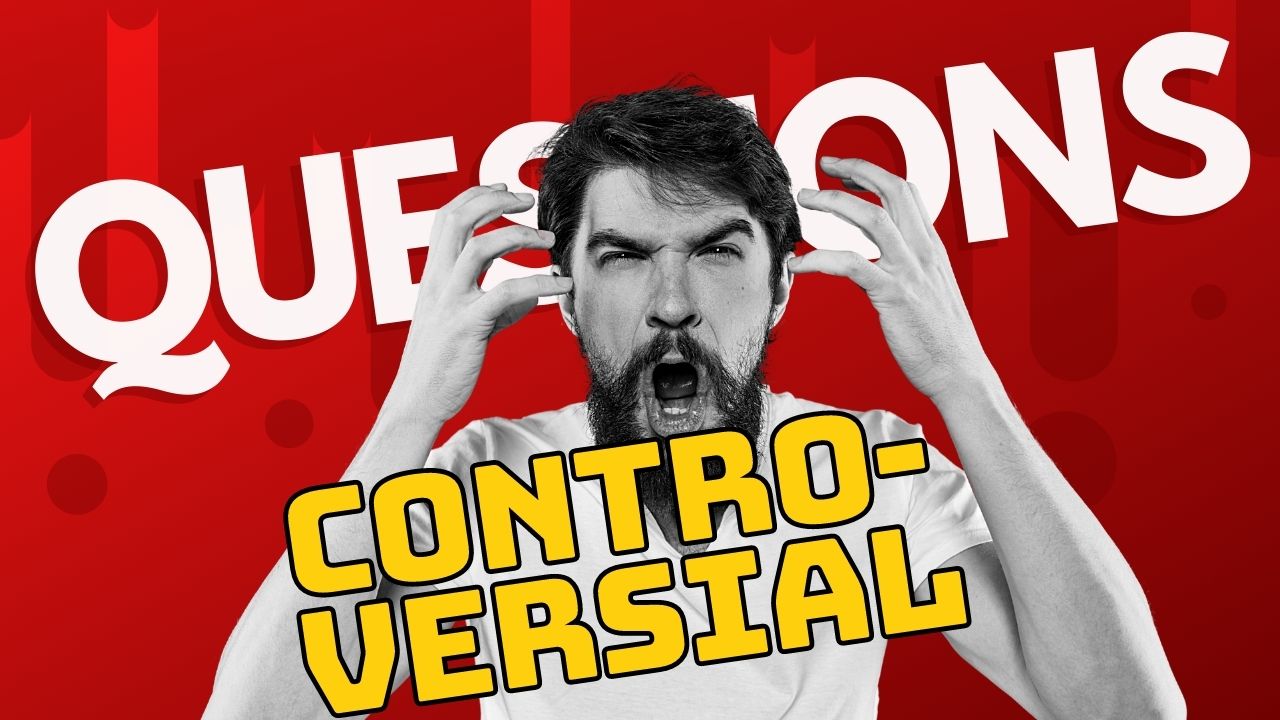Are you tired of bland and boring podcast interviews that fail to ignite any real passion or interest among your listeners? Are you ready to shake things up and spark some real debate and conversation? Then you need to start asking controversial questions.
Controversial questions are the key to creating engaging and thought-provoking content that challenges your audience’s assumptions and forces them to confront difficult issues. But how do you come up with these types of questions, without alienating your guests or your listeners?
In this blog post, we’ll explore the art of crafting controversial questions, from the importance of choosing the right topics to the techniques for framing your questions in a way that sparks meaningful dialogue. We’ll also discuss some of the risks and challenges of asking controversial questions, and provide tips for creating a safe and inclusive environment for all participants in the conversation.
So if you’re ready to take your podcast to the next level, and start asking the tough questions that no one else is willing to ask, then read on to learn how to create controversial questions that will keep your listeners coming back for more.
Having the right question is not always the solution, sometimes you don’t have the skills, and in order to gain them, you should check: Podcast Interviewing the Right Way.
Controversial Questions Examples
Controversial questions are those that touch on sensitive or divisive topics, or challenge commonly-held beliefs or opinions. These types of questions often provoke strong emotional reactions and can lead to heated debates or disagreements. Controversial questions can cover a wide range of subjects, such as politics, social issues, religion, morality, and more.
ome examples of controversial questions might include:
Socio-political Controversial Questions
- What are your thoughts on the current college environment as it pertains to the future workforce?
- Is patriotism ultimately destructive to international relations?
- Should suicide attempts be criminalized?
- Should churches pay taxes?
- Should the death penalty to abolished?
- Is forcing individuals to reduce carbon footprint the best way to combat climate change?
- Should the legal drinking age be lowered or raised?
- Are the The Strikes Laws effectively reducing the number of serious offences?
- Should drug use be treated as a mental health issue rather than a criminal offense.
Controversial questions about religion:
It’s important to note that religion is a sensitive topic, and it’s essential to approach these questions with respect and sensitivity, and to create a safe and inclusive environment for all participants in the conversation. Some examples of controversial questions concerning religion might include:
- Is it possible to be moral without believing in God?
- Should schools teach creationism alongside evolution in science classes?
- What is your stance on the existence of an afterlife, and how does this impact your views on life and death?
- What is your opinion on the role of religion in politics, and do you believe that religious beliefs should influence public policy?
- Do you think that religion should have a place in education, or do you believe that it should be strictly separated from academic institutions?
- What are your thoughts on the use of religious texts to justify acts of violence, and how should society respond to this issue?
- Should religions be exempt from criticism, or should they be subject to the same level of scrutiny as any other belief system?
- How do you reconcile conflicting religious beliefs, such as those held by different branches or sects of the same faith?
- What is your stance on the idea of “religious tolerance,” and how should society balance respect for religious diversity with the need to challenge harmful beliefs and practices?
Again, it’s important to approach these topics with care and consideration for all participants, and to prioritize creating a respectful and inclusive environment for all perspectives.
Controversial questions about manhood and masculinity:
Some examples of controversial questions concerning manhood might include:
- What is the definition of “real manhood,” and how do cultural norms and expectations shape this definition?
- Are men inherently more aggressive or violent than women, or is this a cultural stereotype that needs to be challenged?
- How do issues of race, class, and sexuality intersect with discussions of manhood, and how can we ensure that all men feel included and represented in these conversations?
- Should men be expected to express their emotions openly and vulnerably, or is this a sign of weakness and vulnerability?
- What is the role of men in the fight for gender equality, and how can men actively work to dismantle systems of oppression and inequality?
- How do we address issues of toxic masculinity, such as the pressure to conform to traditional gender roles or the normalization of harmful behavior towards women?
- Should men be held accountable for their actions in cases of sexual harassment or assault, or are men being unfairly targeted by the #MeToo movement?
- What is the impact of the patriarchy on men’s mental health and well-being, and how can we work to dismantle systems of oppression that harm both men and women?
- How can we create a more inclusive and accepting vision of manhood that embraces a wide range of identities, expressions, and experiences?
Controversial questions about relationships:
Relationships are a big category of controversial questions, some examples we could bring are:
- Is monogamy natural and necessary, or is it an outdated societal norm that needs to be challenged?
- How should society view non-monogamous relationships, and should they be given the same legal recognition and protections as traditional marriages?
- Should couples be required to live together before getting married, or is this unnecessary and even harmful to the relationship?
- What is the role of technology in modern relationships, and how has it impacted communication, trust, and intimacy?
- What is the impact of traditional gender roles on relationships, and how can we challenge and redefine these roles to create more equitable partnerships?
- How should we approach issues of consent and sexual violence in relationships, and how can we create a culture of respect and accountability?
- Should couples be required to have prenuptial agreements before getting married, or is this a sign of distrust and lack of commitment?
- What is the role of religion in relationships, and how should individuals navigate differing religious beliefs or practices within a partnership?
- How should society approach the issue of age gaps in relationships, and is it appropriate for individuals to date or marry significantly older or younger partners?
Controversial Questions concerning Sports
Bring up some compelling arguments in the world of sports. The questions given below are fairly all-encompassing, touching on the most popular sports.
-
Will MMA give Boxing a run for its money?
MMA is on the uprise, garnering a lot of attention and currently overtaking Boxing in terms of popularity. Would it get to the point where MMA beats Boxing finance-wise?
-
Is it possible to succeed in an athletic career and personal life at the same time?
Athletes dedicate hours of their time training inorder to keep performing at a high level. Can one find balance between personal life and their sports career?
-
Do sports have any negative effects on human health?
Everyone holds the notion that exercise boosts immunity and promotes proper blood circulation. But does pushing your body as far as athletes and sport-stars have any adverse effect?
Other Sports Questions
- Is the NFL getting soft with concussion rules?
- Do you consider chess to be a full-fledged sport like football and basketball?
- What is the most unbreakable record in sports?
- What do you think of VR technology recently introduced to football?
- Should colleges suffer for their athletes’ mistakes?
- Is basketball losing its popularity nowadays?
- Do all athletes experience stress and how do they avoid it?
Tips for Controversial Podcasts
Taking on a controversial topic can be challenging, but with the right approach, it can also be incredibly rewarding. Here are some tips and best practices for successfully tackling a controversial topic:
- Research the topic thoroughly: Before diving into a controversial topic, it’s important to do your research and understand the issue from all perspectives. This will help you to anticipate objections, avoid misrepresenting arguments, and identify areas of agreement and disagreement.
- Approach the topic with an open mind: It’s important to approach the topic with an open mind and a willingness to consider different viewpoints. Be respectful of other people’s opinions and be open to the possibility that your own perspective may change as a result of the conversation.
- Consider your audience: Think about who your audience is and how they might react to the topic. Consider how you can present the topic in a way that is respectful and sensitive to their perspectives, while still challenging their assumptions and beliefs.
- Use evidence and examples to support your arguments: When discussing controversial topics, it’s important to use evidence and examples to support your arguments. This will help to make your arguments more convincing and credible, and will also help to show that you have done your research and are approaching the topic in a thoughtful and informed way.
- Stay calm and respectful: It’s important to stay calm and respectful, even in the face of disagreement or criticism. Avoid using inflammatory language, personal attacks, or derogatory remarks, and instead focus on presenting your arguments in a clear, logical, and respectful way.
- Acknowledge and address objections: When discussing controversial topics, it’s important to acknowledge and address objections and concerns that others may have. This will help to show that you are open to dialogue and willing to engage with differing viewpoints, and will also help to build trust and credibility with your audience.
- Foster dialogue and discussion: Finally, it’s important to foster dialogue and discussion around controversial topics. Encourage your audience to share their perspectives and engage in a respectful and thoughtful conversation, and be willing to listen and learn from their experiences and viewpoints. This will help to create a more inclusive and open-minded community, and will also help to promote greater understanding and awareness around the issue at hand.
Conclusion
Controversial shows are safe places to air unpopular opinions on some touchy issues happening in the global community. They offer listeners a breath of fresh air from the conventional approach on trending topics in society such as; gun control, racism, global climate change, sex and gender, and free-market capitalism. Navigate through these topics using the questions provided in this article and feel free to tweak them to suit you.
If you’d like to tell a story on your show, narrative podcasts are the best techniques for capturing an engaging story. Read up our article on The Ultimate Guide to Narrative Podcasting, to learn about interviewing a guest and post-producing a narrative styled podcasts.






0 Comments